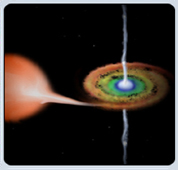Black Holes (def.): A dense, compact object whose gravitational pull is so strong that — within a certain distance of it — nothing can escape, not even light.
If a star has three times or more the core mass of the Sun and collapses, it can form a black hole. These bizarre objects are found across the Universe — within double star systems and at the centers of galaxies where giant black holes grow. X-ray telescopes like Chandra can see superheated matter that is swirling toward the event horizon of a black hole. Chandra has revealed how black holes impact their environments, how they behave, and their role in helping shape the evolution of the cosmos. More >
